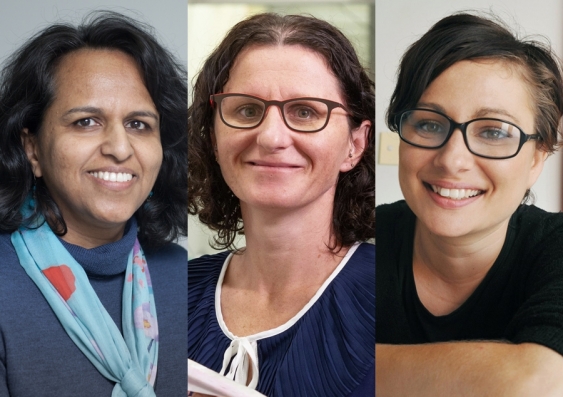Top UNSW researchers named Superstars of STEM for 2019
UNSW's Dr Bianca Capra, Dr Kalinda Griffiths and Dr Beena Ahmed are among 60 academics to be honoured by Science & Technology Australia as the 2019 Superstars of STEM.
UNSW's Dr Bianca Capra, Dr Kalinda Griffiths and Dr Beena Ahmed are among 60 academics to be honoured by Science & Technology Australia as the 2019 Superstars of STEM.

Lucy Carroll
UNSW External Communications
9385 8732, 0402 005 319
l.carroll@unsw.edu.au
Three leading UNSW academics, aerospace engineer Dr Bianca Capra, medical data researcher Dr Kalinda Griffiths and electrical engineer Dr Beena Ahmed are among 60 scientists and technologists to be named Superstars of STEM for 2019 by Science & Technology Australia.
The national program, which launched last year, aims at smashing stereotypes of women in science and creating a new generation of role models for young women and girls.
Minister for Industry, Science and Technology, the Hon Karen Andrews MP, named the Superstars of STEM today, following selection of some of Australia’s most inspiring scientists, technologists and educators.
Over the next three years the program will boost the public visibility of women in science, technology, engineering and mathematics (STEM) disciplines, with the successful recipients undergoing a year of training and support before they actively engage with their communities, school children and the media in 2020.
Professor Emma Johnston AO, President of Science & Technology Australia and Dean of Science at UNSW, said the women will no longer hide their scientific superpowers, and would share them with as many Australians as possible following the launch.
“Each Superstar will connect with hundreds of school children; feature in local, national and international media; and serve as a representative for their work, their discipline and their sector,” Professor Johnston said.
“We are extremely proud to have seen hundreds of capable, skilled, confident women apply for the program, and really look forward to sharing the stories of these impressive 60 Superstars with the world.”
The UNSW academics said successful, enthusiastic and passionate female STEM role models have a strong influence on young women, but many find it difficult to name prominent Australian women working in STEM.
“I get to work in all these areas and am passionate about promoting my industry,” said Dr Capra.
“Unfortunately, we are living in a time when a lot of young women and girls do not consider a career in STEM, let alone aerospace engineering. They are opting out of such careers early in their education, limiting the diversity, insight and lived experience required for scientific advances.
“If we want to address the cultural and societal biases that continue to limit the engagement of women with STEM, it is imperative we address the lack of gender parity in our high-profile STEM role models,” she added.
Dr Capra’s work as an aerospace engineer involves training and inspiring future generations of innovative engineers. She specialises in high speed atmospheric and interplanetary flight and generating practical solutions to reduce the energy use of our built environment.
Dr Kalinda Griffiths, a Yawuru woman and Scientia Fellow at the Centre for Big Data Research at UNSW Medicine, said the program will enable her to draw attention the power of big data and discuss major issues of data governance in Aboriginal and Torres Strait Islander health and research.
Dr Griffith’s work empirically measures complex health disparities in populations through existing data, with a focus on cancer. She is one of the first Indigenous women recognised in the Superstars of STEM program.
“I think scientists and researchers who are passionate and are able to discuss their achievements can inspire an entire generation of girls entering into STEM. This requires exposure, which is why the Superstars of STEM program is so critical,” Dr Griffiths said.
“The Superstars of STEM program means visibility, promotion and exposure to extraordinary women and women of colour who are working in a range of STEM fields.”
Dr Griffiths uses big data to better understand why some populations are healthier than others. Her major research areas include Aboriginal and Torres Strait Islander data governance, the identification of Indigenous peoples in official statistics across the globe and treatment and outcomes of Aboriginal and Torres Strait Islander people with cancer.
Dr Beena Ahmed, a senior lecturer at UNSW Engineering's School of Electrical Engineering and Telecommunications, said it is not only important to attract girls to the field of engineering but recognising the mentorship needed to make them stay.
Dr Ahmed has been an advisor for Women in Engineering student groups and developed mentorship and leadership development programs. She has also created a design-based engineering outreach activities to attract female high school students to the field.
Dr Ahmed's research area focuses on the intersection of health and technology, applying machine learning algorithms on data to improve our lives, such as recognising risk of dementia or insomnia, how to improve speech therapy or language learning exercises correctly and how to regulate stress levels.
Launched in 2017, Superstars of STEM will equip 150 female scientists and technologists with advanced communications skills and provide them with genuine opportunities to use these skills – in the media, on the stage and in speaking with decision makers.